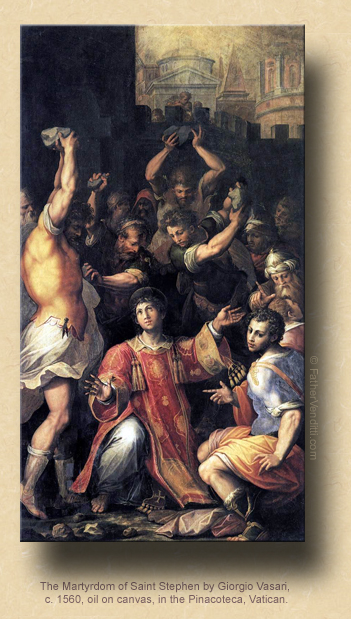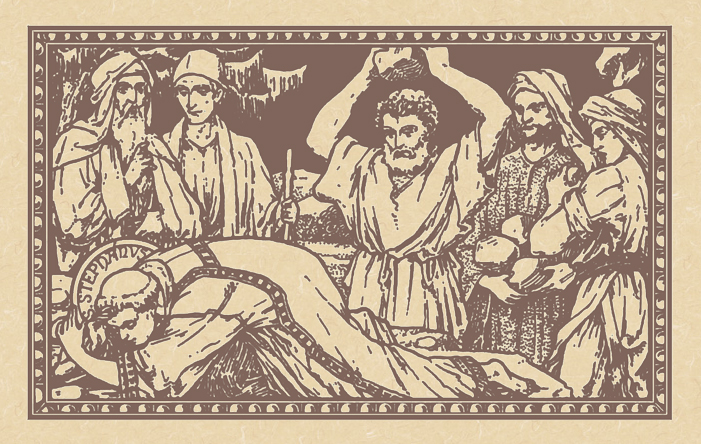Let It Flow.
The Feast of Saint Stephen, the First Martyr.
Lessons from the proper, according to the ordinary form of the Roman Rite:
• Acts 6: 8-10; 7: 54-59.
• Psalm 31: 3-4, 6, 8, 16-17.
• Matthew 10: 17-22.
The Second Class Feast of Saint Stephen, Protomartyr; and, the Commemoration of the Second Day of Christmas.
Lessons from the proper, according to the extraordinary form of the Roman Rite:
• Acts 6: 8-10; 7: 54-59.
• Psalm 118: 23, 86, 117.
• Matthew 23: 34-39.
The Solemn Holy Day of the Synaxis of the Theotokos; a Postfestive Day of the Nativity; and, the Feast of the Holy Martyr Euthymius, Bishop of Sardis.
First & third lessons from the manaion, second & fourth from the pentecostarion, according to the Ruthenian recension of the Byzantine Rite:
• I Timothy 6: 11-16.
• Hebrews 2: 11-18.
• Matthew 12: 15-21.
• Matthew 2: 13-23.
FatherVenditti.com
|
 9:22 AM 12/26/2015 — Today our Church observes the feast of the Deacon and First Martyr, Stephen. He is the first of the seven deacons ordained by the Apostles in Chapter Six of the Acts of the Apostles. He is known as a great preacher, and the Bible speaks of him performing many miracles and cures. At the end of the chapter he is arrested by the Scribes; and, the following chapter is a transcript of his trial, during which he lays out the case for Jesus being the Messiah. He is, of course, convicted of heresy and treason against the Jewish people, and condemned to death by stoning. He is the first person to sacrifice his life for Christ. 9:22 AM 12/26/2015 — Today our Church observes the feast of the Deacon and First Martyr, Stephen. He is the first of the seven deacons ordained by the Apostles in Chapter Six of the Acts of the Apostles. He is known as a great preacher, and the Bible speaks of him performing many miracles and cures. At the end of the chapter he is arrested by the Scribes; and, the following chapter is a transcript of his trial, during which he lays out the case for Jesus being the Messiah. He is, of course, convicted of heresy and treason against the Jewish people, and condemned to death by stoning. He is the first person to sacrifice his life for Christ.
Present at his trial is a young Pharisee named Saul. It wasn't long after the death of Stephen that Saul would have his encounter with the Risen Christ on the road to Damascus, and become the Blessed Apostle Paul.
Now, no date is given for Stephen's martyrdom; we only know that it was not long after the first Pentecost. But why celebrate it right after Christmas? And the answer might be found in the Liturgy of the Byzantine Church with which, as you know, I'm very familiar. In the Divine Liturgy there is a hymn sung prior to the readings called the Kontakion; each Kontakion is proper to the Sunday or the feast, and is normally taken from the writings of the Fathers of the Church. In the Kontakion for the feast of Saint Stephen the people sing:
Yesterday, in human flesh the Master came to us; today, from the flesh, his servant departs. Yesterday, the King was born in the flesh; today, his servant is killed by stoning. Thus, the holy Stephen, the first martyr, is brought to perfection.
Not long after that hymn was composed, that erudite Father of the Western Church, Tertullian, would write, sanguis martyrum semen christianorum—“the blood of the martyrs is the seed of new Christians” (Apol., 50, 13: CCL 1, 171). Stephen's death marks the beginning of the wholesale persecution of the Church, but it also marks the beginning of the Church's phenomenal growth. The sight of so many men and women willingly—even joyfully—going to their deaths rather than deny the divinity of Christ would draw more converts into the Church than even the greatest sermons of the greatest saints. The best preaching is done by example; and, what better example could their be than death?
We celebrate the death of Stephen at Christmas time because giving one's life for Christ is the logical conclusion to the Gospel. In a certain sense, one could say that the first seven chapters of the Acts of the Apostles, written by Saint Luke and ending with the death of Stephen, are the final chapters of Luke's Gospel. From that point on, the Apostles would spread out throughout the world, establishing Churches, baptizing converts, ordaining priests and bishops; all but one of them would, one by one, also give their lives in martyrdom for Christ, until that day that the emperor Constantine would convert to Christianity and make it the law of the land.
What I would offer for your reflection today is to view all this in light of the current situation in which we find ourselves as a Church. For almost the last two hundred years Christianity held a prominent place in our country; but, what was once a Christian country clearly isn't any longer, and it seems we are entering into a new era of Christian persecution. Abortion and other sins against human life are so common that even Catholics now think it's their prerogative to decide such issues for themselves; in state after state marriage is being redefined so as to make the family, the very cell of Christian society, a thing of the past; the moral teachings of the Gospel are openly ridiculed in almost every form of entertainment media; the Holy Priesthood is viewed with suspicion; and all over the world, it seems, ISIS is massacring Christians while the rest of the world just sits by and watches. And in a climate such as this, it is very easy to become despondent, and see nothing but a bleak future for our Church, our country and our world. But I would challenge that. I choose, instead, to see something extraordinary happening.
When I was a Boy Scout, one of the things I remember being taught was that when you cut yourself on something—a twig or a jagged rock or anything—instead of bandaging it right away, you should let it bleed for a bit to allow the flow of blood to wash out of the wound any dirt or bacteria that may be in the wound, as a way of cleansing and purifying it. I think the Church is purified in exactly this way. As the lines between clear good and clear evil are drawn more boldly every day, I see Christians, albeit fewer in number, more forcefully proclaiming and defending the Gospel of Jesus Christ than ever before. I see them willing to suffer for Christ in a way that Christians haven't been called on to do for centuries. I see the pattern, which began with the death of Stephen, and which has been replayed by Christians so many times throughout Church history, beginning to be replayed again. And if we are blessed to witness the beginning of another era of anti-Christian persecution, why suppose that it will end any differently than any time before? Will it not end, as it always has in the past, with the triumph of the Church over her enemies?
Today we celebrate God becoming a man, the birth of Jesus Christ. In doing so, we also celebrate our own rebirth. If, as Tertullian said, the blood of the martyrs is the seed of new Christians, then let it flow, and let us see in this new era the rebirth of the Church like the sprig from the root of Jesse, who is Christ himself.

|

